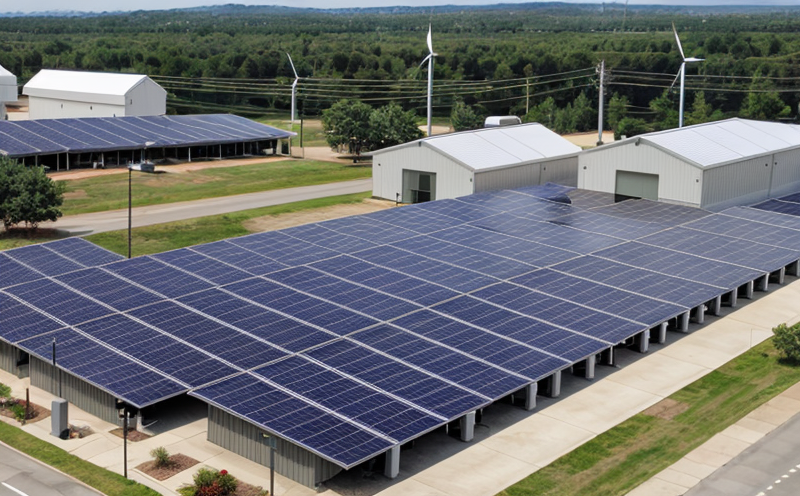ISO 16750 Environmental Reliability Testing of Distributed Energy Devices
The International Standard ISO 16750 series provides a comprehensive framework for testing automotive components and systems under environmental conditions to ensure reliability. This service focuses on the application of these standards specifically in the context of distributed energy devices used within microgrid systems.
Distributed energy resources (DERs) such as solar panels, wind turbines, battery storage systems, and combined heat and power units are critical elements in modern microgrids. These systems must be robust enough to operate reliably under a wide range of environmental conditions including temperature extremes, humidity, rain, dust, and sandstorms. ISO 16750 testing ensures that these devices can withstand such challenging environments without compromising on performance or safety.
The tests encompass a variety of environmental stressors that may be encountered in different geographical locations around the world. This includes exposure to high temperatures (up to 85°C), low temperatures (-40°C), humidity cycling, and salt fog. These conditions simulate real-world scenarios where DERs are installed and operated.
The testing process typically involves subjecting specimens to controlled environmental chambers that can replicate these harsh conditions accurately. The specimens undergo multiple cycles of temperature swings, humidity changes, and exposure to other environmental factors like UV radiation or vibration. After each cycle, detailed measurements and observations are taken to assess the integrity and performance of the device.
Accurate specimen preparation is crucial before any testing begins. This involves ensuring that the device under test (DUT) is properly configured according to the intended use case within a microgrid system. Calibration of measurement instruments used during testing also plays an important role in maintaining accuracy throughout the process.
The results from these rigorous tests provide valuable insights into how well distributed energy devices will perform in various environmental conditions. Compliance with ISO 16750 standards helps manufacturers demonstrate that their products meet safety and reliability requirements, which is essential for gaining market acceptance and regulatory approval.
For quality managers responsible for ensuring product quality, this service offers assurance that the equipment they are purchasing or developing meets stringent international standards. For compliance officers, it provides a pathway to stay ahead of evolving regulations related to environmental performance metrics. R&D engineers benefit by having access to detailed reports that can guide further development efforts aimed at improving resilience against adverse weather patterns.
In summary, ISO 16750 testing offers critical information regarding the durability and reliability of distributed energy devices in microgrids across diverse climates worldwide. By adhering to these internationally recognized guidelines, manufacturers ensure their products are not only innovative but also dependable under challenging operational conditions.
Industry Applications
The application of ISO 16750 testing is particularly relevant for companies involved in the design, manufacturing, and deployment of DERs within microgrids. These organizations include solar panel manufacturers, wind turbine producers, battery storage technology developers, and combined heat and power system designers.
For instance, a solar panel manufacturer might use this service to ensure that their panels can withstand extreme temperatures found in desert regions or arctic climates. Similarly, a company developing fuel cell systems for stationary applications would benefit from understanding how well these units hold up against humidity variations common near coastal areas.
The information obtained through ISO 16750 testing enables manufacturers to make informed decisions about material selection, structural design, and component placement within DERs. This knowledge helps them optimize product performance while minimizing risk associated with failure due to environmental factors.
Moreover, compliance with these standards enhances brand reputation among customers who value sustainability practices. It also opens up opportunities for business expansion into markets where stringent environmental regulations apply.
Competitive Advantage and Market Impact
Adhering to ISO 16750 testing provides significant competitive advantages in the renewable energy sector by setting a benchmark for quality and reliability. In an industry characterized by rapid technological advancement, maintaining consistent performance under diverse environmental conditions is key.
Companies that invest in comprehensive ISO 16750 testing demonstrate their commitment to delivering high-quality products that meet or exceed global standards. This dedication resonates positively with stakeholders including customers, investors, and regulatory bodies alike.
Achieving certification through this rigorous testing process can significantly enhance market competitiveness by differentiating offerings based on superior quality assurance practices. It allows firms to enter new markets more confidently knowing their DERs are capable of performing reliably under a broad spectrum of environmental conditions.
Furthermore, compliance with ISO 16750 standards fosters trust among consumers who prioritize environmental responsibility when making purchasing decisions. This can translate into increased sales and brand loyalty as customers recognize the value added by adhering to such stringent testing protocols.
Use Cases and Application Examples
The use cases for ISO 16750 testing are extensive, particularly when applied to DERs in microgrids. Here are some practical examples:
Solar Panel Manufacturers: Testing solar panels under extreme temperatures helps identify potential weaknesses that could lead to reduced efficiency or failure during deployment.
Wind Turbine Developers: Evaluating wind turbines for their ability to function effectively in harsh winds and salt-laden environments ensures they perform optimally when installed offshore.
Battery Storage System Providers: Subjecting batteries to humidity cycling tests verifies their longevity and reliability in tropical climates where high humidity levels are prevalent.
Combined Heat and Power Unit Manufacturers: Assessing these units for their tolerance against temperature fluctuations aids in optimizing system performance during seasonal changes.





